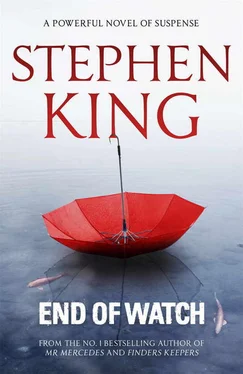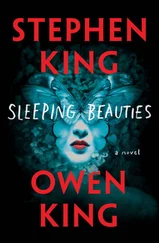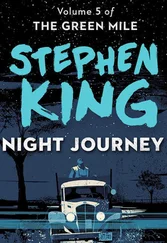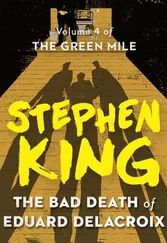‘Hey, Pete, nice to know you still remember my number.’
Pete has no time for banter. ‘I’m going to tell you something, Kermit, and if you decide to run with it, I’m like Sergeant Schultz on Hogan’s Heroes . Remember him?’
‘Sure.’ What Hodges feels in his gut right now isn’t a pain-cramp, but one of excitement. Weird how similar they are. ‘I know nothing.’
‘Right. It has to be that way, because as far as this department is concerned, the murder of Martine Stover and the suicide of her mother is officially a closed case. We are certainly not going to reopen it because of a coincidence, and that’s right from the top. Are we clear on that?’
‘As glass,’ Hodges says. ‘What’s the coincidence?’
‘The head nurse in the Kiner Brain Injury Clinic committed suicide last night. Ruth Scapelli.’
‘I heard,’ Hodges says.
‘While on one of your pilgrimages to visit the delightful Mr Hartsfield, I presume.’
‘Yeah.’ No need to tell Pete that he never got in to see the delightful Mr Hartsfield.
‘Scapelli had one of those game gadgets. A Zappit. She apparently threw it in the trash before she bled out. One of the forensics guys found it.’
‘Huh.’ Hodges goes back into the living room and sits down, wincing when his body folds in the middle. ‘And that’s your idea of a coincidence?’
‘Not necessarily mine,’ Pete says heavily.
‘But?’
‘But I just want to retire in peace, goddammit! If there’s a ball to carry on this one, Izzy can carry it.’
‘But Izzy don’t want to carry no steenkin ball.’
‘No. Neither does the captain, or the commish.’
Hearing this, Hodges is forced to slightly revise his opinion of his old partner as a burnt-out case. ‘You actually spoke to them? Tried to keep this thing alive?’
‘To the captain. Over Izzy Jaynes’s objections, may I add. Her strident objections. The captain talked to the commish. Late this evening I got the word to drop it, and you know why.’
‘Yeah. Because it connects to Brady two ways. Martine Stover was one of his City Center victims. Ruth Scapelli was his nurse. It would take a moderately bright reporter about six minutes to put those things together and stir up a nice fat scare story. That’s what you got from Captain Pedersen?’
‘That’s what I got. No one in police administration wants the spotlight back on Hartsfield, not when he’s still judged incompetent to assist in his own defense and thus unable to stand trial. Hell, no one in city government wants it.’
Hodges is silent, thinking hard – maybe as hard as ever in his life. He learned the phrase to cross the Rubicon way back in high school, and grasped its meaning without Mrs Bradley’s explanation: to make an irrevocable decision. What he learned later, sometimes to his sorrow, is that one comes upon most Rubicons unprepared. If he tells Pete that Barbara Robinson also had a Zappit and may also have had suicide on her mind when she left school and went to Lowtown, Pete will almost have to go back to Pedersen. Two Zappit-related suicides can be written off as coincidence, but three? And okay, Barbara didn’t actually succeed, thank God, but she’s another person with a connection to Brady. She was at the ’Round Here concert, after all. Along with Hilda Carver and Dinah Scott, who also received Zappits. But are the police capable of believing what he’s starting to believe? It’s an important question, because Hodges loves Barbara Robinson and does not want to see her privacy violated without some concrete result to show for it.
‘Kermit? Are you there?’
‘Yeah. Just thinking. Did the Scapelli woman have any visitors last night?’
‘Can’t tell you, because the neighbors haven’t been interviewed. It was a suicide, not a murder.’
‘Olivia Trelawney also committed suicide,’ Hodges says. ‘Remember?’
It’s Pete’s turn to be silent. Of course he remembers, and he also remembers it was an assisted suicide. Hartsfield planted a nasty malware worm in her computer, made her think she was being haunted by the ghost of a young mother killed at City Center. It helped that most people in the city had come to believe Olivia Trelawney’s carelessness with her ignition key was partially responsible for the massacre.
‘Brady always enjoyed—’
‘I know what he always enjoyed,’ Pete says. ‘No need to belabor the point. I’ve got one other scrap for you, if you want it.’
‘Hit me.’
‘I spoke to Nancy Alderson around five this afternoon.’
Good for you, Pete, Hodges thinks. Doing a little more than punching the clock in your last few weeks.
‘She said that Mrs Ellerton already bought her daughter a new computer. For her online class. Said it’s under the basement stairs, still in the carton. Ellerton was going to give it to Martine for her birthday next month.’
‘Planning for the future, in other words. Not the act of a suicidal woman, is it?’
‘No, I wouldn’t say so. I have to go, Kerm. The ball is in your court. Play it or let it lie. Up to you.’
‘Thanks, Pete. I appreciate the heads-up.’
‘I wish it was like the old days,’ Pete says. ‘We would have gone after this thing and let the chips fall.’
‘But it’s not.’ Hodges is rubbing his side again.
‘No. It’s not. You take care of yourself. Put on some goddam weight.’
‘I’ll give it my best shot,’ Hodges says, but he’s talking to no one. Pete is gone.
He brushes his teeth, takes a painkiller, and climbs slowly into his pajamas. Then he goes to bed and stares up into the darkness, waiting for sleep or morning, whichever comes first.
8
Brady was careful to take Babineau’s ID badge from the top of his bureau after donning Babineau’s clothes, because the magnetic strip on the back turns it into an all-access pass. At ten-thirty that night, around the time Hodges is finally getting a bellyful of the Weather Channel, he uses it for the first time, to enter the gated employees’ parking lot behind the main hospital building. The lot is loaded in the daytime, but at this hour he has his pick of spaces. He chooses one as far from the pervasive glare of the arc-sodiums as he can get. He tilts back the seat of Dr B.’s luxury ride and kills the engine.
He drifts into sleep and finds himself cruising through a light fog of disconnected memories, all that remains of Felix Babineau. He tastes the peppermint lipstick of the first girl he ever kissed, Marjorie Patterson at East Junior High, in Joplin, Missouri. He sees a basketball with the word VOIT printed on it in fading black letters. He feels warmth in his training pants as he pees himself while coloring behind his gammer’s sofa, a huge dinosaur covered in faded green velour.
Childhood memories are apparently the last things to go.
Shortly after two A.M. he flinches from a brilliant recollection of his father slapping him for playing with matches in the attic of their house and starts awake with a gasp in the Beemer’s bucket seat. For a moment the clearest detail of that memory lingers: a vein pulsing in his father’s flushed neck, just above the collar of his blue Izod golf shirt.
Then he’s Brady again, wearing a Babineau skin-suit.
9
While mostly confined to Room 217, and to a body that no longer works, Brady has had months to plan, to revise those plans, and revise the revisions. He has made mistakes along the way (he wishes he’d never used Z-Boy to send Hodges a message using the Blue Umbrella site, for instance, and he should have waited before going after Barbara Robinson), yet he has persevered, and here he is, on the verge of success.
He has mentally rehearsed this part of the operation dozens of times, and now moves ahead confidently. A swipe of Babineau’s card gets him in the door marked MAINTENANCE A. On the floors above, the machines that run the hospital are heard as a muted hum, if they are heard at all. Down here they’re a steady thunder, and the tile hallway is stiflingly hot. But it’s deserted, as he expected. A city hospital never falls into a deep sleep, but in the early hours of the morning it shuts its eyes and dozes.
Читать дальше











